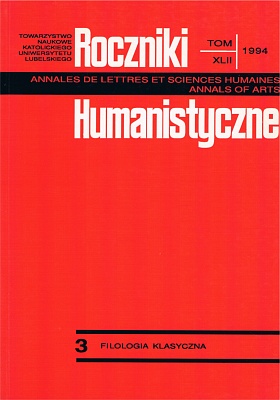Etiologie związane z religią grecką w Tezeuszu Plutarcha zCheronei
Abstrakt
The present article discusses the etiologies occurring in Theseus by Plutarch of Cheronea that are connected with the Greek religion and mythology. The history of the protagonist's life opening the whole series of Parallel lives is set in the times which we place outside the period accessible to historical study. This allowed Plutarch to enrich the description of the protagonist's vicissitudes with a number of etiological insertions referring mainly to Greek feasts and celebrations and to explain their origin by facts and events. Presenting Theseus' life Plutarch mentions more or less well-known religious celebrations, cults and festivities.
Starting with the cult of Konnidas, through Hecalesia, Thesmophoria and Delphinia we pass on to the celebrations that, according to Plutarch, have their source in the ancient mythical custom of sending boys and girls froms Athens to Crete and are connected with the motif of abduction of Ariadna by Theseus, and then the hero's triumphant return to Athens. The successive feasts are connected with consolidation of Theseus' power in Athens: the Isthmian Games, Theseia, Synoikia − are the crowning of the unification of the whole Attica.
Where the description of a certain cult or festivity was treated by Plutarch in an incomplete or fragmentary way supplements and additional explanations have been supplied.
Copyright (c) 1994 Roczniki Humanistyczne

Utwór dostępny jest na licencji Creative Commons Uznanie autorstwa – Użycie niekomercyjne – Bez utworów zależnych 4.0 Międzynarodowe.





